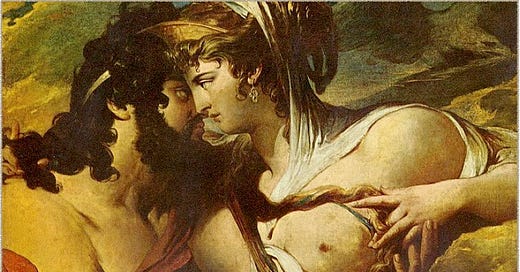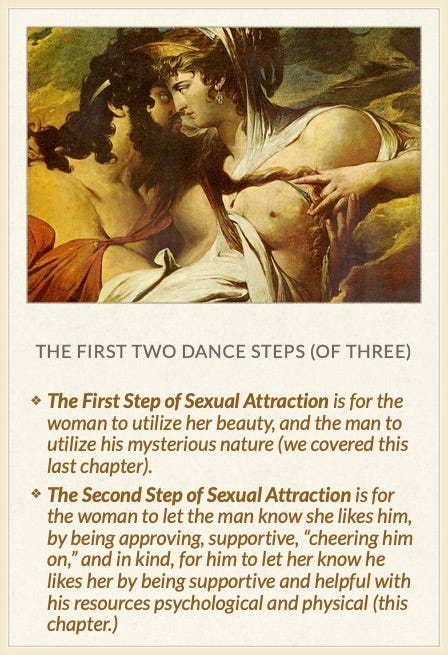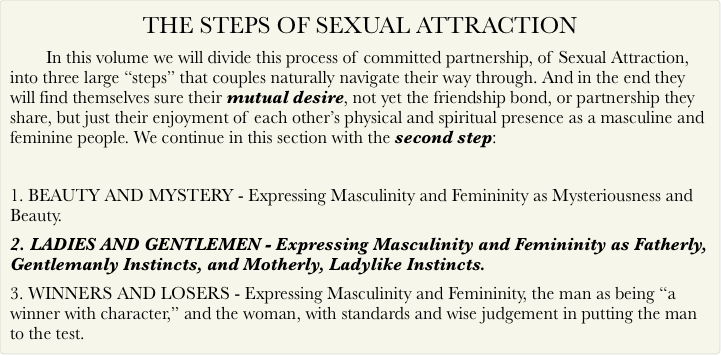“Only great passions can elevate the soul to great things.”
- Denis Diderot, French Philosopher
Bit by bit, you can see how we are taking art and science to assemble a step-by-step process of human courtship that puts masculinity and femininity center stage.
Any complete set of dramas about the male and female experience that has lasted thousands of years would work as well as that of the Greeks – the mythology of the ancient Hindu deities or the ancient Chinese. I have chosen the Greeks because theirs are a complete set of rich stories - they are most widespread throughout the rest of world literature.
Yet, their story themes and social scenarios can be traced to Shakespeare and modern cinema. They stand the test of time, and while transformed, they retain the same psychological processes. Greek myths are also often taught in English-speaking cultures, which I understand best, so I can speak more accurately than others.
You could find the clues that link science, art, the mind, and love in whatever body of cultural mythology you want to study and can understand in your language by assembling them in the specific, step-by-step way I have.
Freud had his spark of creatively joining science and drama through his insight into Sophocles’ story of Oedipus Rex.
Carl Jung went much further in pulling knowledge of the mind from many world myths.
Both systems of explaining the human mind are very complex, yet to many people, they remain inaccessible in the technical way scientific language tends to be used.
The language of psychology is sometimes too complex for the general public to put into practical application.
However, there is a straightforward inference that we could make, which will propel us into some common sense discoveries about ourselves here. It is that:
If a story lasts for thousands of years and speaks to millions – if its characters are embroiled in love and romance, and if these characters talk to nearly every man and woman ever born, in any culture, in any other time of history – then there is something indeed universal in such stories about the architecture of the mind of the reader.
In other words, if a story lasts for centuries or more, there must be something in the story that is universal to the functions of every human mind.
This is a decidedly Jungian approach since Jung made use of the ancient myths with as much rigor as bench scientists in a chemistry lab.
ART AND SCIENCE
The “universal application” of myths hinted at by their universal appeal is similar to the scientific accuracy of experiments set up in research.
The scientific method might show us that if a million people experiment, whatever result they get will be the same result over 99 percent of the time. We may then call what was discovered a theory.
Lasting dramas, such as The Great Myths, reveal a kind of accuracy that science offers - information that can yield accurate results in our lives today.
For example, it was a stunning clue to me in the history of drama that the one most handsome, successful single man in the world—Paris—would be challenged by the three most powerful goddesses to choose between them for which possessed the most attractive temptation.
While Paris ended up choosing the physical beauty of Helen of Troy as his number one attractor, it should not be lost that the three goddesses in total, not in isolation, should represent a complete spectrum of what attracts males.
It sounds like an epic contest – and it is.
Eris and her “discord” in the world, Kallisti, started an actual, real war. We can also take the drama as symbolic.
We again note that not one feminine trait but three traits were offered to Paris.
Are the two traits of the goddesses that he didn’t pick - Hera’s gift of ownership of all the property and treasure of the world and Athena’s gift of the ability to win every contest, every battle - irrelevant in understanding the motivations of the male mind?
Certainly not. Men are indeed attracted to the women who place favor on them over other suitors (which feels like winning first place in a contest) and women who are “hard to get” and who challenge the man to demonstrate his value in the social marketplace.
The Judgment of Paris implies that it is not beauty alone that appeals to men, which would diminish both men and women. Instead, all three traits or “gifts” of femininity must be alluring to men.
The three goddesses are shown in the myth to be the only three vying for top status in what attracts males sexually.
We should then surmise that rather than choosing just one of them to understand the specific drivers of the desires and passions of men, we really must “choose” all three goddesses to have the most complete view of the totality of feminine instincts and how they appeal to men.
Moreover, there is a second principle for arranging the taxonomy of our gender instincts through the nature of the Greek Deities. The “familial” relationships of the deities hints at the analogous, similar instinctual traits correlating between men and women.
Brothers, sisters, husbands, wives, mothers and fathers in the Greek lore all correlate in the pairs of masculine and feminine instincts that are on display in each step of human courtship.
It’s like a puzzle for us to solve, where today’s science literature matches the events and characters of these stories that have lasted in relevance to our natures for 2500 years.
There are courses and instructional videos divided by topics and areas of the Romantic Dynamics® system that go very deep into the Advanced Membership and its training, quizzes, and live discussion and instruction.
One of the practical goals of Romantipedia as a compendium of human courtship is to inform you of the basics of this new body of knowledge. With your permission for you to become an Upgraded, Advanced Member with a small monthly fee, you will get access to the Upgraded articles at Romantipedia.substack.com, the courses, quizzes, and tests, and the discussion community where we go so much further into the material that explains a method of analyzing love, even in these challenging times between men and women.
Thank you for joining us for the Romantic Dynamics® Course on the courses page of the site for Upgraded Members.
Keep reading with a 7-day free trial
Subscribe to Romantipedia®️ to keep reading this post and get 7 days of free access to the full post archives.







